|
|
|
Sort Order |
|
|
|
Items / Page
|
|
|
|
|
|
|
| Srl | Item |
| 1 |
ID:
138984
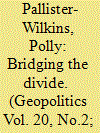

|
|
|
|
|
| Summary/Abstract |
Building on a long history of spatial control through walling in the region, walls and fences have been built in the Middle East in recent years to undertake a range of practices. Gated communities, residential and security compounds, anti-migrant walls, separation barriers and counter-insurgency fences can all be found in the Middle East. These walls address and govern problems that take the population as their subject. These walls all share a common frame of viewing the populations they work to govern as ‘problematic’ in multiple ways. This paper explores how walls have been and continue to be used in governing populations through mobility and incorporating a combination of disciplinary and biopolitical techniques through a range of spatial and territorial repertoires. As such it works to bridge the divide in border studies and critical security studies between geopolitical/topographical and biopolitical/topological approaches to borders and governance.
|
|
|
|
|
|
|
|
|
|
|
|
|
|
|
|
| 2 |
ID:
138983
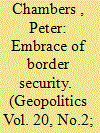

|
|
|
|
|
| Summary/Abstract |
Border security has become one of the key means by which the sovereignty and security of powerful nation-states is projected. This paper offers a set of observations of the Australian Commonwealth’s descriptions and instructions for its embrace of border security. Border security is legible here as a geopolitics that transforms the rights and responsibilities of maritime jurisdictions into a space of security that projects national sovereignty through the interdiction of boat arrivals. Its intensification as Operation Sovereign Borders is read as a further variation within national sovereignty, one that elevates the decisionist prerogative into total deterrence. Operation Sovereign Borders pushes the limits of sovereignty’s existence in the state toward a total domination of space, perception and human life in Australia’s maritime jurisdictions, in the name of the nation. This necessitates the development, defence and reinforcement of a regionally engaged materiality that is embodied, extended, enacted, and distributed. The intended effect of this coordinated effort is to secure the nation’s sovereignty as a unity, but the broader effect has been to devalue offshore life to secure onshore interests, in a way that now necessitates indefinite offshore detention.
|
|
|
|
|
|
|
|
|
|
|
|
|
|
|
|
| 3 |
ID:
138981
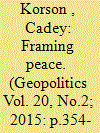

|
|
|
|
|
| Summary/Abstract |
Despite conducting sixty-six peacekeeping missions, the United Nations (UN) must repeatedly justify the necessity and wisdom of continuing these operations to the international community. Domestic success is contingent to a large degree on the willingness of citizens to cooperate with peacekeepers. Consequently, public perception in both the host country and abroad has become crucial to the continuation and maintenance of UN Peacekeeping Operations (UNPKO). A discourse analysis of domestic and international newspapers, radio transcripts, and television broadcasts about contemporaneous UNPKOs in Haiti and Côte d’Ivoire reveals staggering disparities. Diverging interpretations of mission mandates, violence, censorship, and colonial practices contribute to the way in which peacekeeping missions are perceived. This article identifies how current UNPKOs are perceived domestically and internationally and emphasises the role of these perceptions as a basis for evaluating and improving these operations.
|
|
|
|
|
|
|
|
|
|
|
|
|
|
|
|
| 4 |
ID:
138985
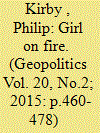

|
|
|
|
|
| Summary/Abstract |
This paper explores the gender politics of the ‘Hunger Games’ film series. It suggests that the lead character of the series, Katniss Everdeen, represents a progressive portrayal of the female action hero, contrary to much Hollywood fare. Theoretically and methodologically, the paper approaches the series through the rubric of ‘popular geopolitics 2.0ʹ and suggests that, within this, opportunities exist for further alignment between feminist geopolitics and popular geopolitics. To support its analysis, the paper offers a critical review of coverage of the series on feminist online media. The paper finishes by assessing the progressive potential of the series, as well as future directions for feminist and popular geopolitics.
|
|
|
|
|
|
|
|
|
|
|
|
|
|
|
|
| 5 |
ID:
138975
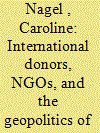

|
|
|
|
|
| Summary/Abstract |
In the aftermath of 9/11, Western states have increasingly used the promotion of democracy and civil society as a means of effecting geopolitical aims in the Middle East. Democracy promotion has involved extensive financial support of local non-governmental organisations (NGOs) who work to instill (neo)liberal-democratic values and norms among populations that are seen to be lacking in these. This article, in examining the production of citizenship as a geopolitical practice, brings critical-geography scholarship into conversation with the critical literature on Western-funded civil society in ‘transitional’ societies. We focus on the case of Lebanon, which has been targeted by Western donors due to its strategic importance in deepening regional geopolitical rivalries. We highlight the pervasiveness of Western democracy discourses in the work of local NGOs, and especially the tendency to view sectarian politics as a source of instability that must be sublimated by new forms of societal consensus. But our account also highlights the scepticism that NGO directors feel toward their own efficacy and toward the influence of Western donors in Lebanese society. Their critical assessments of Western-funded civil society call into question the extent to which democracy promotion can secure Western geopolitical interests, much less enforce Western political supremacy.
|
|
|
|
|
|
|
|
|
|
|
|
|
|
|
|
| 6 |
ID:
138979
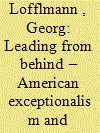

|
|
|
|
|
| Summary/Abstract |
This article explores the discursive performance and political significance of ‘American exceptionalism’ under President Obama. Moving beyond a critical examination of geopolitical identity, it investigates how representations of exceptionalism, understood as ideational construct of uniqueness and superiority, are linked to practices of US foreign and security policy that confirm, but also contest, established notions of American leadership in world politics. A particular focus lies on the 2012 presidential campaign, and how diverging ‘exceptionalist’ visions between Obama and Mitt Romney testified to competing ideas for American primacy and cooperative engagement. The article will further examine the cases of ‘leading from behind’ in Libya, American non-intervention against Assad in Syria, and US reactions to current crises concerning Ukraine and ISIS. The contextualisation of these episodes in contemporary, geopolitical discourse reveals how the practice of US foreign and security policy under Obama is shaped by a conflicted and paradoxical vision of post-American hegemony.
|
|
|
|
|
|
|
|
|
|
|
|
|
|
|
|
| 7 |
ID:
138977


|
|
|
|
|
| Summary/Abstract |
This paper analyses the practical geopolitical representations of the Czech Republic in American presidential materials between 1989 and 2009. Using structured discourse analysis, it highlights the impact of identity construction on policymaking and draws on critical geopolitics to highlight conceptualisations and geopolitical representations connected with the Czech Republic over four American presidential administrations. The article demonstrates the power of practical geopolitics in constructing images and cementing certain preconceived notions about a given place. Five main representations are identified, presenting the Czech Republic as: interconnected with American identity, a symbol of democracy and freedom, a victim of tyranny, a loyal ally, and as interchangeable with other countries in Central Europe. The article concludes that such multifaceted conceptualisations not only define the United States’ relationship with the Czech Republic, but also have strategic value. These conceptualisations helped to justify certain American policies and to reinforce a particular interpretation of American identity.
|
|
|
|
|
|
|
|
|
|
|
|
|
|
|
|
| 8 |
ID:
138976
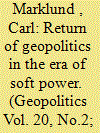

|
|
|
|
|
| Summary/Abstract |
This paper looks at how Swedish political scientist Rudolf Kjellén (1864–1922) conceived of the relationship between nature and culture, between material and immaterial power as well as the role of soft power, geopolitical imaginary and competitive identity in off-setting potentially unfavourable geopolitical conditions for small and medium-sized states. It is argued that with regard to small states, Kjellén did not maintain a consistent separation between “soft” cultural resources of power and “hard” laws of nature. Rather, he placed the mutually constitutive tension between geography (nature) and politics (culture) at the centre of his politico-scientific analysis, arguing that active “biopolitics” could supplement geopolitics. In Kjellén’s conception, cultural and natural resources are instruments of an otherwise integrated notion of power which challenges the contemporary separation between hard and soft power.
|
|
|
|
|
|
|
|
|
|
|
|
|
|
|
|
| 9 |
ID:
138978
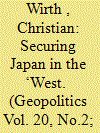

|
|
|
|
|
| Summary/Abstract |
Why has the military dimension of the US-Japan relationship remained the central point of reference for Japanese foreign relations, despite the demise of the Soviet Union? Why has Japan, deepening economic interdependence notwithstanding, remained politically distant from East Asia? Based on analysis of statements by Japanese and US political elites and academics regarding the US-Japan alliance, this article argues that the rise of China, coterminous with the rise of ‘Asia’, challenges the notion of the ‘West’ as, according to standards of industrial modernity, a superior social and political order. These moving ideational boundaries question Japan’s position as the most advanced Asian nation and member of the (Western) international society of states. Therefore, the US-Japan alliance has since the mid-1990s become increasingly important for securing Japan in the ‘West’ and the ‘West’s boundaries in East Asia.
|
|
|
|
|
|
|
|
|
|
|
|
|
|
|
|
| 10 |
ID:
138980


|
|
|
|
|
| Summary/Abstract |
This paper analyses the alternative territorialities that characterise the conflict on the installation of a US military MUOS ground station in Sicily (Italy). On the one hand, the proponents see territory from a techno-centric vision as a site of strategic importance for the global politics of securitisation since it serves the optimisation of the US military ‘system of systems’. On the other hand, the No-MUOS mobilisation resists this image of territory by claiming it as a place of everyday life, and opposes hegemonic territorialisation through the manipulation of an ensemble of discursive and practical mediators within different spheres of action. The local conflict around a radar infrastructure evolves into a clash between different logics of territorial organisation: a conflict mostly concerning the control over spatial borders, knowledge production, and imaginary circulation.
|
|
|
|
|
|
|
|
|
|
|
|
|
|
|
|
| 11 |
ID:
138982


|
|
|
|
|
| Summary/Abstract |
Recent discussion in critical border studies has reaffirmed the validity and necessity of multiperspectival approaches which move beyond state-centric outlooks to include diverse viewpoints of people at or on borders. One understudied aspect of everyday border life involves how international development organisations fit within wider dynamics of cross-border activities. Drawing upon experiences of development projects at a key border crossing between Kenya and Uganda, I explore (1) how perceptions of risk and danger contribute to constructions of the border towns as places in need of development interventions, and (2) how this border also adds to practical and logistical concerns already held by development organisations as they deliver these interventions. I argue that the place-based mix of location, material forms, and perceptions or practices impacts how ‘inter-national development’ is rationalised in border regions.
|
|
|
|
|
|
|
|
|
|
|
|
|
|
|
|
|
|
|
|
|